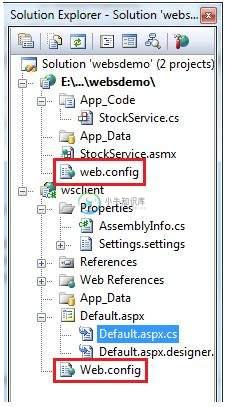配置(Configuration)
ASP.NET应用程序的行为受配置文件中的不同设置的影响:
- machine.config
- web.config
machine.config文件包含所有支持设置的默认值和计算机特定值。 机器设置由系统管理员控制,通常不允许应用程序访问此文件。
但是,应用程序可以通过在其根文件夹中创建web.config文件来覆盖默认值。 web.config文件是machine.config文件的子集。
如果应用程序包含子目录,则可以为每个文件夹定义web.config文件。 每个配置文件的范围以分层自顶向下的方式确定。
任何web.config文件都可以在本地扩展,限制或覆盖在上一级定义的任何设置。
Visual Studio为每个项目生成默认的web.config文件。 应用程序可以在没有web.config文件的情况下执行,但是,如果没有web.config文件,则无法调试应用程序。
下图显示了Web服务教程中使用的示例示例的解决方案资源管理器:

在此应用程序中,有两个项目的web.config文件,即Web服务和调用Web服务的Web站点。
web.config文件将配置元素作为根节点。 此元素内的信息分为两个主要区域:配置部分 - 处理程序声明区域和配置部分设置区域。
以下代码段显示了配置文件的基本语法:
<configuration>
<!-- Configuration section-handler declaration area. -->
<configSections>
<section name="section1" type="section1Handler" />
<section name="section2" type="section2Handler" />
</configSections>
<!-- Configuration section settings area. -->
<section1>
<s1Setting1 attribute1="attr1" />
</section1>
<section2>
<s2Setting1 attribute1="attr1" />
</section2>
<system.web>
<authentication mode="Windows" />
</system.web>
</configuration>
配置节处理程序声明
配置节处理程序包含在标记中。 每个配置处理程序指定包含在文件中的配置节的名称,该配置节提供一些配置数据。 它具有以下基本语法:
<configSections>
<section />
<sectionGroup />
<remove />
<clear/>
</configSections>
它有以下要素:
Clear - 删除对继承的节和节组的所有引用。
Remove - 删除对继承的节和节组的引用。
Section - 它定义配置节处理程序和配置元素之间的关联。
Section group - 它定义配置节处理程序和配置节之间的关联。
应用程序设置
应用程序设置允许存储应用程序范围的名称 - 值对以进行只读访问。 例如,您可以将自定义应用程序设置定义为:
<configuration>
<appSettings>
<add key="Application Name" value="MyApplication" />
</appSettings>
</configuration>
例如,您还可以存储图书的名称及其ISBN编号:
<configuration>
<appSettings>
<add key="appISBN" value="0-273-68726-3" />
<add key="appBook" value="Corporate Finance" />
</appSettings>
</configuration>
连接字符串
连接字符串显示网站可用的数据库连接字符串。 例如:
<connectionStrings>
<add name="ASPDotNetStepByStepConnectionString"
connectionString="Provider=Microsoft.Jet.OLEDB.4.0;
Data Source=E:\\projects\datacaching\ /
datacaching\App_Data\ASPDotNetStepByStep.mdb"
providerName="System.Data.OleDb" />
<add name="booksConnectionString"
connectionString="Provider=Microsoft.Jet.OLEDB.4.0;
Data Source=C:\ \databinding\App_Data\books.mdb"
providerName="System.Data.OleDb" />
</connectionStrings>
System.Web Element
system.web元素指定ASP.NET配置节的根元素,并包含配置ASP.NET Web应用程序和控制应用程序行为方式的配置元素。
它包含了在常见应用程序中需要调整的大多数配置元素。 元素的基本语法如下:
<system.web>
<anonymousIdentification>
<authentication>
<authorization>
<browserCaps>
<caching>
<clientTarget>
<compilation>
<customErrors>
<deployment>
<deviceFilters>
<globalization>
<healthMonitoring>
<hostingEnvironment>
<httpCookies>
<httpHandlers>
<httpModules>
<httpRuntime>
<identity>
<machineKey>
<membership>
<mobileControls>
<pages>
<processModel>
<profile>
<roleManager>
<securityPolicy>
<sessionPageState>
<sessionState>
<siteMap>
<trace>
<trust>
<urlMappings>
<webControls>
<webParts>
<webServices>
<xhtmlConformance>
</system.web>
下表提供了system.web元素的一些常见子元素的简要说明:
AnonymousIdentification
这需要识别在需要授权时未经过身份验证的用户。
身份验证 (Authentication)
它配置身份验证支持。 基本语法如下:
<authentication mode="[Windows|Forms|Passport|None]">
<forms>...</forms>
<passport/>
</authentication>
授权 (Authorization)
它配置授权支持。 基本语法如下:
<authorization>
<allow .../>
<deny .../>
</authorization>
Caching
它配置缓存设置。 基本语法如下:
<caching>
<cache>...</cache>
<outputCache>...</outputCache>
<outputCacheSettings>...</outputCacheSettings>
<sqlCacheDependency>...</sqlCacheDependency>
</caching>
CustomErrors (CustomErrors)
它定义了自定义错误消息。 基本语法如下:
<customErrors defaultRedirect="url" mode="On|Off|RemoteOnly">
<error. . ./>
</customErrors>
部署(Deployment)
它定义了用于部署的配置设置。 基本语法如下:
<deployment retail="true|false" />
HostingEnvironment (HostingEnvironment)
它定义了托管环境的配置设置。 基本语法如下:
<hostingEnvironment idleTimeout="HH:MM:SS" shadowCopyBinAssemblies="true|false"
shutdownTimeout="number" urlMetadataSlidingExpiration="HH:MM:SS" />
Identity
它配置应用程序的标识。 基本语法如下:
<identity impersonate="true|false" userName="domain\username"
password="<secure password>"/>
MachineKey (MachineKey)
它配置用于加密和解密Forms身份验证cookie数据的密钥。
它还允许配置验证密钥,该验证密钥对视图状态数据执行消息验证检查并形成验证票证。 基本语法是:
<machineKey validationKey="AutoGenerate,IsolateApps" [String]
decryptionKey="AutoGenerate,IsolateApps" [String]
validation="HMACSHA256" [SHA1 | MD5 | 3DES | AES | HMACSHA256 |
HMACSHA384 | HMACSHA512 | alg:algorithm_name]
decryption="Auto" [Auto | DES | 3DES | AES | alg:algorithm_name]
/>
会员(Membership)
这会配置管理和验证用户帐户的参数。 基本语法是:
<membership defaultProvider="provider name"
userIsOnlineTimeWindow="number of minutes" hashAlgorithmType="SHA1">
<providers>...</providers>
</membership>
Pages
它提供特定于页面的配置。 基本语法是:
<pages asyncTimeout="number" autoEventWireup="[True|False]"
buffer="[True|False]" clientIDMode="[AutoID|Predictable|Static]"
compilationMode="[Always|Auto|Never]"
controlRenderingCompatibilityVersion="[3.5|4.0]"
enableEventValidation="[True|False]"
enableSessionState="[True|False|ReadOnly]"
enableViewState="[True|False]"
enableViewStateMac="[True|False]"
maintainScrollPositionOnPostBack="[True|False]"
masterPageFile="file path"
maxPageStateFieldLength="number"
pageBaseType="typename, assembly"
pageParserFilterType="string"
smartNavigation="[True|False]"
styleSheetTheme="string"
theme="string"
userControlBaseType="typename"
validateRequest="[True|False]"
viewStateEncryptionMode="[Always|Auto|Never]" >
<controls>...</controls>
<namespaces>...</namespaces>
<tagMapping>...</tagMapping>
<ignoreDeviceFilters>...</ignoreDeviceFilters>
</pages>
Profile
它配置用户配置文件参数。 基本语法是:
<profile enabled="true|false" inherits="fully qualified type reference"
automaticSaveEnabled="true|false" defaultProvider="provider name">
<properties>...</properties>
<providers>...</providers>
</profile>
RoleManager (RoleManager)
它配置用户角色的设置。 基本语法是:
<roleManager cacheRolesInCookie="true|false" cookieName="name"
cookiePath="/" cookieProtection="All|Encryption|Validation|None"
cookieRequireSSL="true|false " cookieSlidingExpiration="true|false "
cookieTimeout="number of minutes" createPersistentCookie="true|false"
defaultProvider="provider name" domain="cookie domain">
enabled="true|false"
maxCachedResults="maximum number of role names cached"
<providers>...</providers>
</roleManager>
SecurityPolicy (SecurityPolicy)
它配置安全策略。 基本语法是:
<securityPolicy>
<trustLevel />
</securityPolicy>
UrlMappings (UrlMappings)
它定义映射以隐藏原始URL并提供更加用户友好的URL。 基本语法是:
<urlMappings enabled="true|false">
<add.../>
<clear />
<remove.../>
</urlMappings>
WebControls (WebControls)
它提供客户端脚本的共享位置的名称。 基本语法是:
<webControls clientScriptsLocation="String" />
Web服务(WebServices)
这会配置Web服务。

